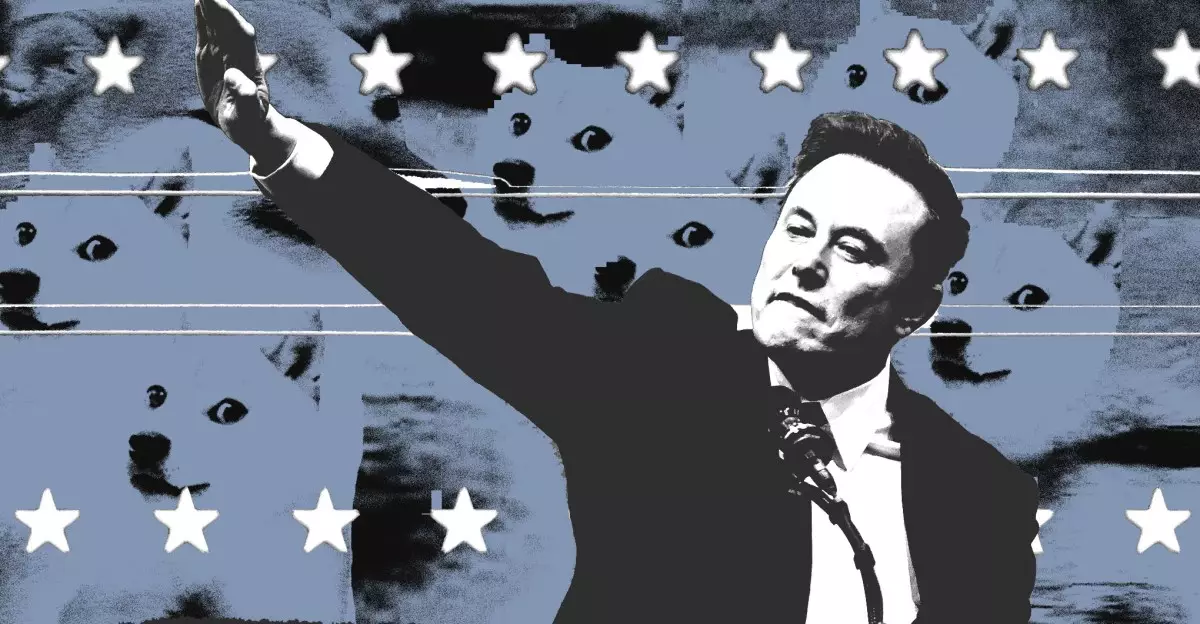In an era where social media serves as a powerful platform for shaping public opinion, the expressions of extremist ideologies have found new life in the hands of supposedly influential figures. A recent incident involving Marko Elez, a former staffer at the Department of Government Efficiency (DOGE), serves as a stark reminder of how deeply entrenched and dangerous these ideologies can be, especially within governmental structures. The troubling revelations about Elez’s past social media activity, particularly his advocacy for a eugenic immigration policy and the repealing of the Civil Rights Act, raise critical questions about the intersection of technology, politics, and societal values.
Marko Elez, a youthful figure within DOGE, found himself in hot water after the Wall Street Journal uncovered disturbing posts linked to an old social media account. Under the handle @nullllptr, Elez made various provocative statements, including claims that “99% of Indian H1Bs will be replaced by slightly smarter LLMs,” which reinforced a divisive narrative concerning immigration and employment. This impulsive rhetoric not only highlighted a blatant disregard for diversity but also echoed wider digital conversations that pander to harmful racial stereotypes.
What is alarming is the apparent normalization of such views within certain political circles. Despite Elez’s resignation following the public outcry, it reveals how entrenched racist sentiments can flourish in environments seeking to challenge established norms of diversity, equity, and inclusion (DEI). The paradox here lies in the fact that Elez, a young staffer tasked with governmental efficiency, was embroiled in discussions that contradict fundamental democratic principles.
The creation of DOGE under Elon Musk’s initiative was portrayed as a benevolent attempt to streamline bureaucratic processes and promote technological advancements. However, as investigations unravel the façade, it becomes evident that the organization has dedicated its resources to dismantling initiatives promoting DEI within federal agencies. Under the guise of efficiency, there appears to be a selective targeting of programs that challenge the status quo of white supremacy. The disturbing irony is that while championing efficiency, DOGE actively undermines essential protections designed to uphold civil rights.
Elez’s former colleagues at DOGE found themselves in a landscape rapidly morphing into a battleground for ideological purity, abandoning the principles of inclusiveness and equality in favor of a more restricted paradigm. The transition from merely debating public policy to endorsing radical shifts in governance reflects a shift within privilege and power dynamics.
While Elez’s resignation may appear as a noteworthy case study, it is crucial to place it within the broader narrative of political staffing decisions in an era characterized by extremism. For instance, the recent hiring of Darren Beattie by the State Department—a figure known for his controversial views and connections to white nationalism—demonstrates a disturbing trend of rewarding individuals who align with divisive ideologies rather than penalizing them.
This propensity to appoint figures like Beattie signifies a tacit endorsement of the insidious currents that run through certain areas of government, all while the concept of “wokeness” becomes a scapegoat for a more extensive ideological battle.
The term “groyperfication,” used by writer John Ganz, encapsulates a critical shift happening among young conservatives. This phenomenon illustrates how young, right-wing individuals are increasingly immersed in online subcultures that perpetuate extremist ideologies—be it through discussions of eugenics, white superiority, or the Great Replacement theory. As algorithms facilitate the spread of such toxic ideas, a new generation seems to gravitate towards identities that embrace exclusion rather than inclusion.
This cultural backdrop creates fertile ground for breeding further radicalization. The discussions once confined to digital forums have begun to seep into public policy, challenging the foundations of democracy and inclusivity. For many individuals, platforms like X (Twitter) provide a veil of anonymity that enables the spread of hatred and misinformation without fear of accountability.
The troubling saga surrounding Marko Elez reminds us that the lines between social media discourse and governmental action are increasingly blurred. In our digital age, the implications of online rhetoric cannot be underestimated, as harmful ideologies gain traction and make their way into the halls of power. It is imperative for advocates of democracy to remain vigilant against these tides of extremism, ensuring that diversity, equality, and inclusion remain at the forefront of our collective consciousness. We must not allow silence to endorse these dangerous ideologies; instead, active engagement in discourse and policy-making is essential to counterbalance the shadows cast by digital extremism.


Leave a Reply